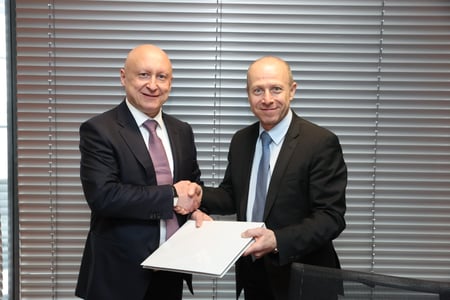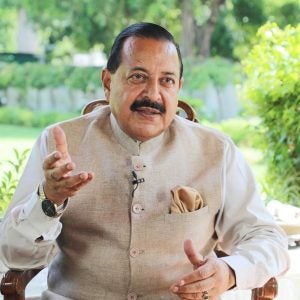 US-based Westinghouse Electric Company and Czech power company CEZ have signed an agreement on the supply of fuel assemblies for the Dukovany NPP, which comprises four Soviet-built VVER-440 reactors. Westinghouse says it will deliver fuel beginning in 2024, “replacing the current supplier, with an anticipated term of seven years”. The current fuel supplier is Russia’s TVEL.
US-based Westinghouse Electric Company and Czech power company CEZ have signed an agreement on the supply of fuel assemblies for the Dukovany NPP, which comprises four Soviet-built VVER-440 reactors. Westinghouse says it will deliver fuel beginning in 2024, “replacing the current supplier, with an anticipated term of seven years”. The current fuel supplier is Russia’s TVEL.
According to Westinghouse, the contract “builds on the long-standing partnership between the two companies and a recent agreement to provide modified Robust Westinghouse Fuel Assemblies (RWFA) for the Temelin nuclear power plant”. The Temelin NPP comprises two Russian-designed VVER-1000 units.
CEZ Group concluded contracts with Westinghouse and France’s Framatome in 2022 for the supply of fuel assemblies for the Temelín NPP. Deliveries of assemblies for more than 10 years will begin in 2024. Previously fuel was supplied by TVEL. Currently, CEZ has fuel assemblies for approximately two years of operation at Temelin. The stock at the Dukovany NPP is even greater, CEZ said. "We decided to increase the stockpile at both NPPs in 2016. As a result, we have enough assemblies at Dukovany for approximately three years of operation of all the units, said Bohdan Zronek, Director of the Cez Nuclear Power Division, at that time. “Of course, we continue to think about the diversification of suppliers," he added.
TVEL had long been the fuel supplier for all of CEZ’s NPPs. However, after outbreak of the conflict in Ukraine CEZ began looking for alternative suppliers. While Westinghouse had earlier developed fuel for VVER-1000 reactors, but the design for VVER-440 fuel was still under development. At the end of 2022, Spain’s Enusa Industrias Avanzadas and Westinghouse formalised a cooperation agreement regarding the manufacture of VVER-440 fuel. Enusa began to reinstall a production line for this product at its Juzbado factory with the aim of licensing it in 2023 to make possible fuel deliveries from the beginning of 2024.
Through this agreement, Westinghouse and Enusa will manufacture the fuel using their factories at Västerås, in Sweden, and Juzbado (Salamanca), in Spain, as supply contracts are signed.
Westinghouse and Enusa have partnered since 1974 under a Pressurised-Water Reactor (PWR) fuel technology transfer agreement supporting plants in Spain, Belgium, and France among others. In 1999, British Nuclear Fuels Ltd (BNFL) bought Westinghouse’s commercial nuclear power businesses. Between 2001 and 2007, BNFL/Westinghouse delivered a total of 741 VVER-440 fuel assemblies to Fortum’s Loviisa NPP in Finland, which were manufactured by Enusa in Spain.
The fuel assembly design – NOVA E-3 (fixed assembly) and NOVCA (follower) – was developed in 1996-98 in a programme involving BNFL (UK), IVO (Finland) and PAKS (Hungary). The programme included extensive testing and qualification of the new design. In 1998, the manufacturing of five Lead Test Assemblies at Springfields, UK, was completed and the fuel was delivered for insertion in Loviisa unit 2.
These designs were integrated into the Westinghouse fuel product portfolio, and all the intellectual property for the VVER-440 fuel was transferred from BNFL to Westinghouse in 2005-2006 when Westinghouse was purchased by Toshiba. However, the Loviisa fuel contract was not renewed and Westinghouse withdrew from the market in 2008, and closed down the supply chain and development of the VVER-440 design.
In 2014 reactivation of the VVER-440 market was reconsidered and Westinghouse, in a consortium comprising nine organisations, applied for a Euratom funded programme for diversification of the VVER fuel market in Europe. It was granted €2m in 2015 to run the European Supply of Safe Nuclear Fuel (ESSANUF) HORIZON 2020 project. Both Enusa and Westinghouse worked together on the ESSANUF project in 2015-2017. Others involved in ESSANUF included VUJE (Slovakia), UJV Rez (Czech Republic), Lappeenranta University of Technology (Finland), UK National Nuclear Laboratory, NucleoCon (Slovakia), Kharkiv Institute of Physics & Technology, and the European Commission Joint Research Centre in Karlsruhe (JRC–Karlsruhe). The project was funded under the Euratom Research & Training Programme (2014-2018), which is part of the EU Research & Innovation Framework Horizon 2020."
Image: L-R – David Beneš, Chairman and CEO of ČEZ and Patrick Fragman, CEO of Westinghouse (courtesy of Westinghouse)






